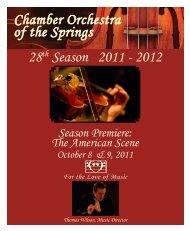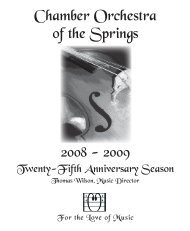Click Here For Concert Program - Chamber Orchestra of the Springs
Click Here For Concert Program - Chamber Orchestra of the Springs
Click Here For Concert Program - Chamber Orchestra of the Springs
You also want an ePaper? Increase the reach of your titles
YUMPU automatically turns print PDFs into web optimized ePapers that Google loves.
to <strong>the</strong> organist Christian Gottlob Neefe, with whom<br />
he studied. Attempts to establish him as a prodigy in<br />
<strong>the</strong> mold <strong>of</strong> Mozart had little success, however.<br />
In 1787, Beethoven was sent to Vienna,<br />
but his mo<strong>the</strong>r fell ill, and he had to return to Bonn<br />
almost immediately. She died a few months later,<br />
and in 1789 Beethoven himself requested that his<br />
alcoholic fa<strong>the</strong>r be retired, a move that left him<br />
responsible for his two younger bro<strong>the</strong>rs. Beethoven<br />
left Bonn for Vienna a second time in November <strong>of</strong><br />
1792, in order to study with Haydn.<br />
In 1794, French forces occupied <strong>the</strong><br />
Rhineland; consequently, Beethoven’s ties with and<br />
support from <strong>the</strong> Bonn court came to an end. His<br />
fa<strong>the</strong>r had died a month after his departure from<br />
Bonn, and his bro<strong>the</strong>rs joined him in Vienna. He<br />
remained <strong>the</strong>re <strong>the</strong> rest <strong>of</strong> his life, leaving only for<br />
holidays and concerts in nearby cities. His only<br />
extended journey was to Prague, Dresden, and<br />
Berlin in 1796. Beethoven never held an <strong>of</strong>ficial<br />
position in Vienna. He supported himself by giving<br />
concerts, teaching piano, and through <strong>the</strong> sale <strong>of</strong> his<br />
compositions. Members <strong>of</strong> <strong>the</strong> Viennese aristocracy<br />
were his steady patrons, and in 1809 three <strong>of</strong> <strong>the</strong>m—<br />
Prince Kinsky, Prince Lobkowitz, and <strong>the</strong> Archduke<br />
Rudolph—even guaranteed him a yearly income<br />
with <strong>the</strong> sole condition that he remain in Vienna.<br />
The last 30 years <strong>of</strong> Beethoven’s life were<br />
shaped by a series <strong>of</strong> personal crises, <strong>the</strong> first <strong>of</strong> which<br />
was <strong>the</strong> onset <strong>of</strong> deafness. The early symptoms,<br />
noticeable to <strong>the</strong> composer already before 1800,<br />
affected him socially more than musically. His<br />
reaction was despair, resignation, and defiance.<br />
Resolving finally to “seize fate by <strong>the</strong> throat,” he<br />
emerged from <strong>the</strong> crisis with a series <strong>of</strong> triumphant<br />
works that mark <strong>the</strong> beginning <strong>of</strong> a new period in his<br />
stylistic development.<br />
A second crisis a decade later was <strong>the</strong><br />
breaking <strong>of</strong>f <strong>of</strong> a relationship with an unnamed<br />
lady (probably Antonie Brentano, <strong>the</strong> wife <strong>of</strong> a<br />
friend) known to us as <strong>the</strong> “Immortal Beloved,” as<br />
Beethoven addressed her in a series <strong>of</strong> letters in July,<br />
1812. This was apparently <strong>the</strong> most serious <strong>of</strong> several<br />
<strong>Program</strong> Notes, continued<br />
such relationships with women who were in some<br />
way out <strong>of</strong> his reach, and its traumatic conclusion<br />
was followed by a lengthy period <strong>of</strong> resignation and<br />
reduced musical activity.<br />
During this time Beethoven’s deafness<br />
advanced to <strong>the</strong> stage that he could no longer<br />
perform publicly, and he required a slate or little<br />
notebooks (now known as “conversation books”) to<br />
communicate with visitors. The death <strong>of</strong> his bro<strong>the</strong>r<br />
Caspar Carl in 1815 led to a 5-year legal struggle<br />
for custody <strong>of</strong> Caspar’s son Karl, <strong>the</strong>n 9 years old,<br />
in whom Beethoven saw a last chance for <strong>the</strong><br />
domestic life that had o<strong>the</strong>rwise eluded him. His<br />
possessiveness <strong>of</strong> Karl provoked a final crisis in <strong>the</strong><br />
summer <strong>of</strong> 1826, when <strong>the</strong> young man attempted<br />
suicide. Shortly <strong>the</strong>reafter, Beethoven’s health began<br />
to fail, and he died on March 26, 1827, in Vienna.<br />
Max Reger<br />
Hermit Playing <strong>the</strong> Violin,<br />
from “Four Böcklin Poems”<br />
Overview: Max Reger<br />
Born: March 19, 1873, in Bavaria<br />
Died: May 11, 1916, in Leipzig<br />
Work Composed: 1913<br />
Why It Matters: While music <strong>of</strong> <strong>the</strong> early twentieth<br />
century was engulfed in modernism, composers like<br />
Reger continued in <strong>the</strong> Romantic tradition. One<br />
<strong>of</strong> Reger’s best and most mature<br />
works, Four Böcklin Poems is an<br />
underperformed gem.<br />
I am sitting in <strong>the</strong> smallest room<br />
<strong>of</strong> my house. I have your review<br />
before me. In a moment it will<br />
be behind me.—Max Reger,<br />
responding to a critic.<br />
Four popular paintings by Swiss artist<br />
Arnold Böcklin were <strong>the</strong> inspiration for Max<br />
Reger’s Four Tone Poems after Arnold Böcklin,<br />
composed in 1913. Pictorial narratives were<br />
<strong>Program</strong> notes continue on page 16<br />
15




